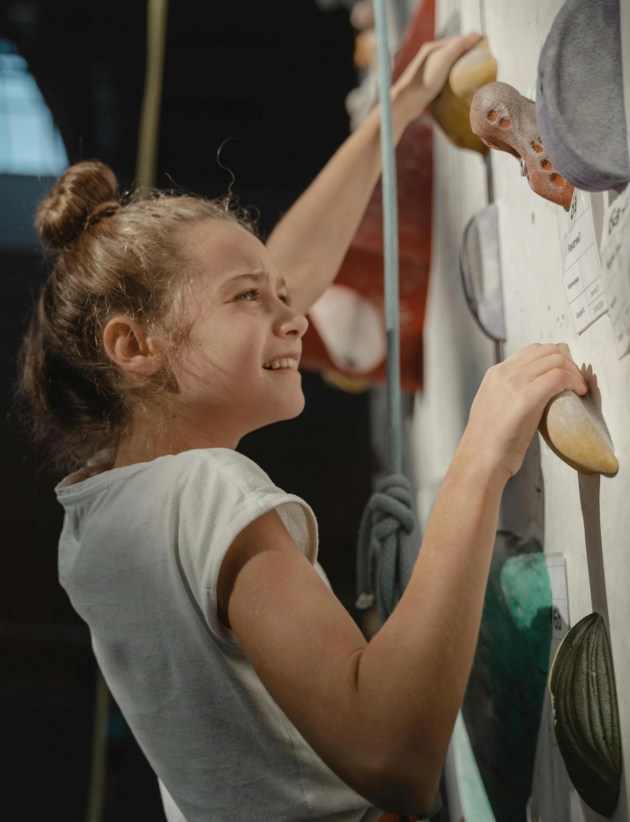On any given day, a look around Asphalt Green, the expansive sports complex on the Upper East Side, will reveal a diversity of athletes, each undergoing a kind of transformation. At the Olympic-sized pool, for example, a group of children bussed in from Harlem take their very first strokes, while teenage members of the elite AGUA (Asphalt Green Unified Aquatics) swim team—many of whom also took their first strokes here—practice for Olympic-qualifying competitions.
In the adjacent warm-water exercise pool, toddlers move their hands and feet, while a child with a disability strengthens her muscles through water aerobics. And on the green Super Turf field outside, young athletes learn the fundamentals of soccer next to members of the nationally competitive Green Wave soccer team.
Asphalt Green is an innovative notfor-profit, with a mission, according to Executive Director Carol Tweedy, “to provide a range of services to the couch potato all the way through the elite athlete.” Built on a 5.5-acre plot of land that was once an asphalt plant, Asphalt Green’s impressive athletic facilities include the aforementioned pools, a 15,000-square foot stateof-the-art fitness center, indoor and outdoor basketball courts, a gymnastics room, a martial arts studio and a bright green Super Turf athletic field (which, along with the asphalt plant, inspired the organization’s name).
Asphalt Green offers instruction in everything from the fundamentals of a sport to coaching for elite athletes, group lessons to private instruction, and sports camps to sports-themed birthday parties. They offer an array of sports, including swimming, baseball, basketball, flag football, gymnastics, soccer, martial arts, triathalon training and more.
Though known for its expert sports instruction (the staff includes nationally and internationally respected athletes, from Iron Man finishers to Olympians), its cutting-edge facilities and accomplished swim team, Asphalt Green is most passionate about reaching a certain set of potential athletes:
New York City schoolchildren, 43 percent of whom are overweight or obese. “We have to develop a very aggressive agenda on dealing with childhood obesity, which means getting kids to eat healthily and getting them moving,” Tweedy says. It is especially important, she maintains, to reach these children now. “Being physically active when you’re a kid creates a habit, sense of comfort, and, hopefully, a sense of joy in movement that can be carried into adulthood,” she says.
Tweedy and Senior Program Director Dr. Paul Weiss are particularly interested in bringing Asphalt Green’s programs to underserved schoolchildren in the neighboring community of East Harlem, which has one of the highest obesity rates in the five boroughs.
To that end, they have developed four community-based initiatives to help combat obesity and encourage fitness in that neighborhood: the Waterproofing Program, the Recess Enhancement Program, the Community Sports League and an aggressive scholarship policy.
The Waterproofing Program is a full-year program for 2nd to 5th graders, that takes place during the school day. Currently, children are bussed from their schools to the Asphalt Green campus, but in January, Asphalt Green will also launch the program at a Harlem public school and a community center. The program focuses on drowning prevention and creating a lifetime fitness habit. Tweedy notes that by the end of the program, 73 percent of the participants, most of whom begin the program not knowing how to swim, become deep water swimmers. Participants in the program are also encouraged to take part in the Big Swim, a celebrated annual competitive swimming event open to all children (last year over 800 showed up).
The Recess Enhancement Program (also active in neighborhoods outside of Harlem) is a curriculum of playground games that Asphalt Green brings to school campuses in order to address the inactivity and violent behavior endemic to school recess periods. The games, specially designed for small spaces, are meant to get kids moving and teach them conflict-resolution skills. The program has achieved positive results both in the school yard, where there are fewer incidents of violence, and in the classroom, where kids have shown increased attentiveness.
The Community Sports League is a competitive, interscholastic flag football league for middle-school children intended to facilitate physical activity and boost academic achievement. Teachers and administrators who become team coaches are trained in the Positive Coaching Alliance Curriculum, which, according to Weiss, teaches children to approach competitive athletics responsibly. Asphalt Green also plans to introduce a basketball program in the winter and a soccer program in the spring.
Lastly, aggressive scholarship programs ensure that underserved children have access to everything Asphalt Green has to offer. Weiss appreciates the diversity that this scholarship program brings to Asphalt Green, noting that in programs like the summer day camp and the swim team, diversity “improves the product not only for the child who is getting the scholarship but for all the children.”
Common to all of Asphalt Green’s programs, from the fee-based to the community outreach, is the idea that sports have the power to transform lives, playing an important role in personal growth and confidence-building.
For Tweedy, Asphalt Green is more than a place—it is the concept that “within the construct of a city, one can experience the joy of movement and the physical activity that comes with green spaces.” And through physical activity, she says, “Asphalt Green literally makes people stronger to face life’s challenges.”
Asphalt Green, 555 East 90th Street, 212-369-8890, asphaltgreen.org.





















